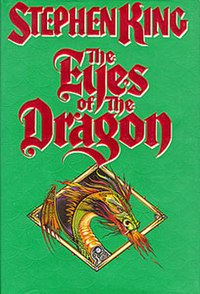By Daniel Shultz
This is
only the second fiction novel I’ve read by the “Master of Horror” Stephen King,
the other being The Dead Zone (although I’m halfway through The Stand), and I,
in honor of an adaption of a book I’ll never read coming out this week, decided
now was a good time to review The Eyes of
The Dragon.
The Eyes of the Dragon is a pretty
straightforward fantasy novel, other than having some overlapping characters
and themes it stands outside what people usually consider a King book to be
like. There are very few overtly horrific images or scenes and for the most
part it is a book that could be read by young and old alike.
The plot
revolves around a kingdom in turmoil. The king is old and dying and his chief advisor
is an eerily familiarly named man named Flagg who makes claims to be a magician. The king has two sons the oldest
one, Peter, is known well loved and noble, and the younger son, Thomas, is
almost ignored except by Flagg. Like many stories revolving around kings and
their sons there is a jealousy that develops amongst the brothers. Soon Peter
is framed for a crime and Thomas rises to “power.” The rest of the book follows
the ramifications of these two events and the possible reconciliation.
I enjoyed
reading this book, but it didn’t wow me. I suppose I had unrealistic
expectations, especially after having read so many innovative and fantastic
fantasy books in the past few years. I think a good comparison for this book
would be the Farseer Trilogy by Robin Hobb. While neither those books nor this
one are particularly bad they just don’t compel me to reflect or reread them as
much as some others may.
Perhaps the
fault lies in me? I can’t really be sure, but I think King was trying to write
a straightforward old-fashioned fantasy story. While some of King’s trademark
symbolism and his popular themes, Children overcoming evil being the biggest,
the overall story is very classical. There is very little to make it stand out as
being from a particular time period. It could just as easily been written in
the first half of the 20 century as the second half. This element makes it a
unique book, so many novels follow a trend to capitalize on popularity or at
least reflect the cultural trends of the day, even when they are suppose to be
set a long, long time ago in a land far, far away. Yet this book doesn’t do
that, instead it almost deliberately tries to be old fashioned and classical. I
admire it for that.
If someone
has been wanting to read King or is looking for a shorter fantasy book that won’t
give them headaches with backstory and magic then this book might be for them.


No comments:
Post a Comment